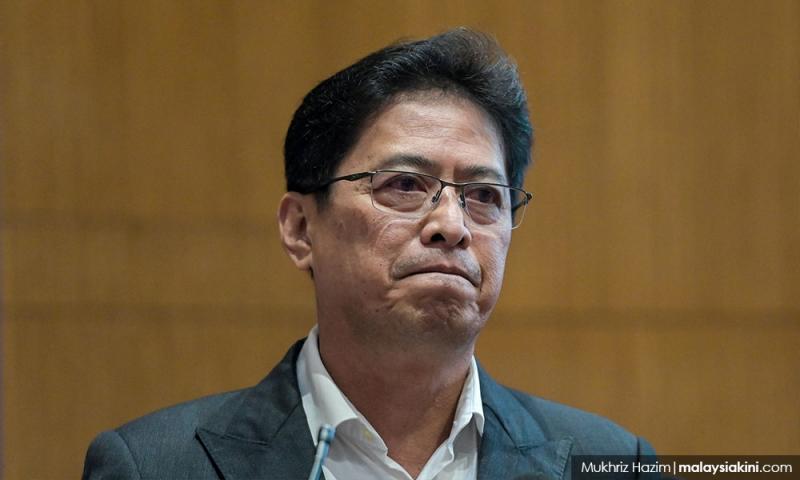
R Nadeswaran
“Those who fail to learn from history are doomed to repeat it.”
- Winston Churchill*
* kt comments: Churchill merely paraphrased George Santayana the original author of the statement, saying in the British Parliament in 1948 "Those who do not learn history are doomed to repeat it"
“Those who fail to learn from history are doomed to repeat it.”
- Winston Churchill*
* kt comments: Churchill merely paraphrased George Santayana the original author of the statement, saying in the British Parliament in 1948 "Those who do not learn history are doomed to repeat it"
COMMENT | Six months ago this week, political economist Edmund Terence Gomez quit as a member of the MACC’s Consultation and Corruption Prevention Panel. What started off as a ripple turned into a tidal wave culminating in street demonstrations calling for the resignation of its head honcho, Azam Baki.
In his resignation letter which was made public on Dec 27 last year, Gomez said disturbing questions had been raised about the “nexus between business and law enforcement” and a “conflict of interest” situation involving Azam and his ownership of corporate stock.
The matter would have ended there but Azam announced at a media conference that he allowed his share trading account to be used by his brother. Maybe at that time, he was not aware that this was an admission of sorts that he breached the Securities Industry (Central Depositories) Act (SICDA).
But the Securities Commission found that the trades were executed by Azam himself and not any third party.
To put it crudely, he was caught with his pants down for having lied to and misled the public previously by claiming “my brother did it”.
Nevertheless, he was exonerated by the Anti-Corruption Advisory Board chairperson Abu Zahar Ujang, while the prime minister and members of his cabinet maintained an elegant silence on the matter as if it was a trivial issue.
Far from it - Section 10 of the Public Officers Regulation (Conduct and Discipline) 1993, all public servants must declare both movable properties, such as money in bank accounts, motor vehicles, jewelleries, firearms, shares, warrants, stocks, bonds and securities, as well as immovable properties, such as land, landed properties, and of course, business ownership or directorship.
In addition, there are related rules in Service Circular Number 3/2002 – Ownership and Declaration of Assets by Public Officials, which prevents a public servant from owning more than RM100,000 worth of shares in any company.
Feet-dragging
Under Azam’s leadership several issues have been raised. The latest being payments made to four ministers. Details of such dealing were contained in a ledger which was part of the voluminous documents tendered at the ongoing High Court trial of former deputy prime minister, Ahmad Zahid Hamidi.
The MACC acted almost immediately after former Goldman Sachs banker Tim Leisner testified in a New York court in February that he had given gifts to his mistresses worth millions. But when it came to disclosures in a local trial, there was feet-dragging.
Why investigation papers on such illegal transactions were not opened as soon as the ledger was sighted when investigations began several years ago is anyone’s guess. Only after a public outcry did the MACC announce their intentions to investigate.
In a column on Jan 7, I wrote: “To say that the image and reputation of the Malaysian Anti-Corruption Commission (MACC) are in tatters would be an understatement.
“Its chief, Azam Baki, offered a preposterous and ludicrous explanation on his reported ownership of shares in public-listed companies. But he did not do himself any favour by claiming, ‘I did no wrong’.”
The problems within MACC are like all other issues of integrity and accountability in our system of governance. After an issue is brought to the fore, there will be all kinds of statements and clamours but no action. After a few weeks, it will be forgotten and things will go back to business as usual.
Azam continues to head the commission but paid no heed or even considered the many suggestions and positive ideas to rejuvenate the anti-corruption drive which appears to be staggering to a halt.
The National Anti-Corruption Plan (NACP) was launched three years ago but it has yet to be implemented in full. The government spends large sums of money, time and effort to draw up comprehensive strategies which most of the time, end up in a steel cabinet of government offices gathering dust.
In a couple of years, there will be some minor changes to the plan and it will be re-badged and launched as NACP 2.0. And the saga will continue.
R NADESWARAN is a veteran journalist who writes on bread-and-butter issues. Comments: citizen.nades22@gmail.com

Majority of Malaysians consider systemic corruption as a minor issue, or irrelevant to Government,as long as , in the case of Malays, their Race and Religion are seen as protected, or in the case of Chinese somebody can promise they will be "business friendly".
ReplyDeleteHence Bossku the Folk Hero.
"The problems within MACC are like all other issues of integrity and accountability in our system of governance. After an issue is brought to the fore, there will be all kinds of statements and clamours but no action. After a few weeks, it will be forgotten and things will go back to business as usual."
ReplyDeleteThe case of Azam is only one of many that quietly go away because we, as a society, do not seem too much concerned with the behaviour of the privileged few.
The MACC, frankly, is a totally useless organisation. Instead of resigning, this Azam fellow is clinging on to his job. And the kerajaan allah has not said anything.
I can only speculate his (Azam) being MACC chief still. 1) he is useful to kerajaan allah to do the latter's bidding and 2) he (Azam) understands his value and worth to kerajaan allah. I would not be surprised if Azam knows of the skeletons in kerajaan allah's closet.
The HK anti-corruption agency must be shaking its head and sighing about what has become of its "pupil". Unfortunately for the HK Anti-corruption agency, it is linked uncomfortably with the MACC.
Irony is the HK Anti-Corruption Agency was inspired by the Malaysian ACA (fore-runner of the MACC), at a time when the Malaysian ACA (then under Justice Hashim, the judge who rendered the original UMNO as illegal in 1987) was an organisation of integrity
DeleteYup KT, this is a case of the student (HK ICAC) outperforming the master (formerly Malaysia ACA)
Delete